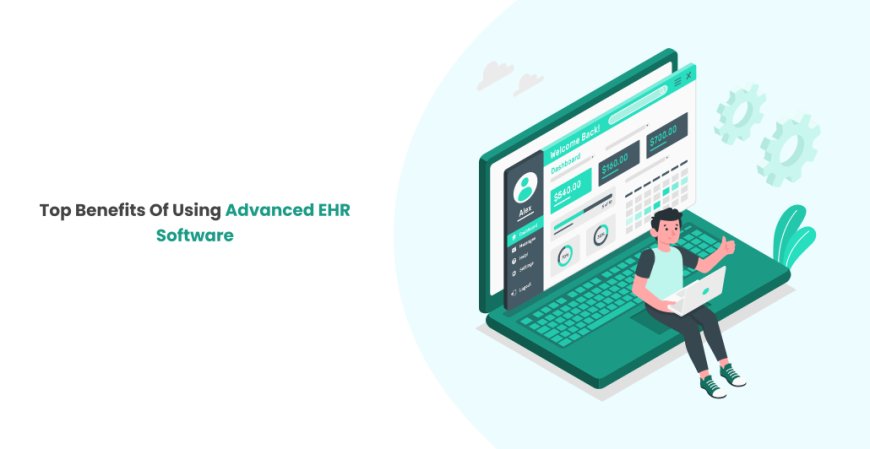Top Benefits of Using Advanced EHR Software
Discover how advanced EHR software improves patient care, streamlines workflows, ensures data security, and enhances efficiency in healthcare management.

Introduction
Operating in today's rapidly changing health environment, technology is the linchpin to effective, patient-centered care. Among such transformational tools in this domain is EHR Software or Electronic Health Record Software. The EHR software digitized patient records, streamlined workflows, and many more revolutionary ways it changed how medical professionals manage information and deliver care. This article discusses the best advantages of advanced EHR software underlining how it enhances healthcare delivery, ensures data accuracy, and supports both patients and providers.
1. Improved Patient Care
The ultimate goal of any healthcare system is to ensure good patient care; EHR software systems are crucial in the realization of this goal. Here's how:
Comprehensive Patient Record: Advanced EHR software provides a single platform for storing and accessing patient information. Therefore, healthcare providers will be able to access the patient's history, medication, allergies, and diagnostic studies with ease. Improved Diagnosis and Treatment Plans: Real-time availability of patient data reduces the chances of errors; thus, doctors can make better decisions and prepare personalized treatment plans.
Smooth Communication: Some EHR software systems offer safe and secure communications between providers and patients, specialists. It makes collaboration further by providing improved coordination in the management of a patient.
Preventative Care Alerts: It can also notify EHR on preventive measures related to vaccinations, screenings, and follow-up visits that all result in healthier patients who show more responsiveness.
Patient Engagement: EHR web-based software solutions also provide portals for patients through which they can access their medical history, book appointments, and even communicate with their doctors directly.
2. Administrative Simplification
The administrative burden for health information management is immense at times beyond control. The Electronic Health Record system reduces the administrative workload. Here are some of the important features:
Smoothing of Mundane Tasks: Advanced EHR software automates many cumbersome procedures, such as scheduling appointments, preparing bills, and coding. This, in return, takes the administrative pressure off the workforce.
Simplified Billing and Claims: While the integrated billing features ensure the right codes, EHR software reduces claim denials and firms up revenue cycles for healthcare organizations.
Efficient charting: through the use of templates and voice recognition tools, there are various effective ways in which providers document patient encounters using hospital EHR software.
Regulatory Compliance: the best EHR software ensures that healthcare regulations, such as HIPAA, are followed through the provision of proper measures that safeguard information about patients.
Resource Optimization: EHR software systems enable health facilities to maximize resources because of the simplification of operations hence making the processes efficient.
3. Improved Data Security and Accessibility
In health care, data security and ease of access are some areas to be mentioned. Advanced EHR responds in the following manner regarding those requirements: Data Storage Securely: Cloud-based EHR software has made sure that any backup of the patient's data has been kept securely encrypted. Consequently, these applications will prevent data breaches.
Accessibility from Anywhere and at Any Time: Cloud-based solutions allow authorized persons to access patient records from any place. This has facilitated telehealth service and remote consultation in recent times.
Audit Trails: Most EHR software builds an audit trail, assuring complete transparency and accountability about every access and modification made in the data.
Disaster Recovery: Cloud-based EHR software comes equipped with good disaster recovery solutions. This means none of the crucial patient data is ever lost.
Role-Based Access System: Advanced EHR software is available with customizable permission modules. These permission modules guarantee that sensitive information only crops up for persons who must rightfully see the same information.
4. Better Interoperability and Scalability
Interoperability and scalability remain a great concern for any long-term healthcare institution. The extended capability in this regard that is demonstrated by integrating the same with other systems, starting from laboratory information to radiology applications, right into the Pharmacy, is intended to be well-equipped when integrated into the system. Advanced software facilitates the sharing of data in promoting multi-discipline share from one medical facility contributing to continuance of positive care amongst all the patients.
Specialty Support: Different types of EHR software exist for a host of medical fields, including pediatric care, cardiology, dermatology, and many more.
Scalable Solution: Cloud-based EHR software can grow along with the healthcare organization and accommodate increased data and user requirements without substantial investments in infrastructure.
Interoperability Standards: Most of the modern EHR software systems have been designed to implement international standards like HL7 and FHIR, thus allowing better interoperability on different platforms.
5. Economic benefits accumulated revenue and overall revenue cycle development
Operational Cost Reduction: EHR software systems help reduce paper-based exercises, saving on printing and storage costs. Providers are more productive, and see more patients, so automation of processes frees resources to grow the practice or increase revenue.
Accurate Revenue Management: Real-time insurance verification is facilitated; similarly, automated claims processing ensures minimal revenue leakage with EHR software systems.
A smaller number of errors: EHR software cuts down on administrative and clinical errors. As such, it slashes correction costs and malpractice claims in hospitals.
Scalable investment: EHR software is cloud-based; flexible pricing models are placed to make it more affordable for small practices up to large hospitals.
Conclusion
Advanced EHR software has transformed the healthcare industry in a big way, including smoothing operations, improving patient care, and even offering security for data. From comprehensive hospital-based EHR software to cloud-based, location-based access, their merits cannot be slighted. Besides, with the heterogeneous nature of EHR software, providers can choose one that best suits their needs. Since healthcare has been going digital for quite some time now, investment in an integrated electronic health record system is no longer a luxury but rather a strategic requirement toward achieving operational excellence in delivering quality care.
What's Your Reaction?
























